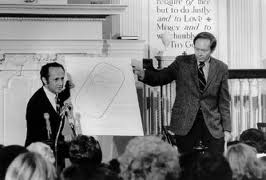 Herbert Vetter created Cambridge Forum in 1967 when he began his service as Minister-at-Large at First Parish (Unitarian Universalist) in Cambridge. Designed to provide a space for public discussion of touchstone social and political issues, in its early days Cambridge Forum hosted such controversial figures as then-Secretary of Defense Robert McNamara discussing the war in Vietnam. Other early speakers included Buckminster Fuller, Derek Bok, Shirley Chisholm, Norman Lear, and John Kenneth Galbraith. The roster of speakers at Cambridge Forum from its beginning is truly outstanding and a tribute to Herb’s vision of the important work of the Forum to engage individuals in a deeper understanding of the forces at work in 20th-century American society. His insights and his dedication to that vision created enormous respect for Cambridge Forum, an invaluable legacy for a small independent non-profit.
Herbert Vetter created Cambridge Forum in 1967 when he began his service as Minister-at-Large at First Parish (Unitarian Universalist) in Cambridge. Designed to provide a space for public discussion of touchstone social and political issues, in its early days Cambridge Forum hosted such controversial figures as then-Secretary of Defense Robert McNamara discussing the war in Vietnam. Other early speakers included Buckminster Fuller, Derek Bok, Shirley Chisholm, Norman Lear, and John Kenneth Galbraith. The roster of speakers at Cambridge Forum from its beginning is truly outstanding and a tribute to Herb’s vision of the important work of the Forum to engage individuals in a deeper understanding of the forces at work in 20th-century American society. His insights and his dedication to that vision created enormous respect for Cambridge Forum, an invaluable legacy for a small independent non-profit.
Herb was deeply committed to advancing several important discussions; the anti-nuclear movement and the environmental movement remained close to his heart throughout his life. He also loved poetry, a love which shone clearly in his programs about Japanese Haiku, the poetry of Khalil Gibran, and the prayers of Rabindranath Tagore. A forum he always wanted to present, but never found a way to justify under the Cambridge Forum mission, would have featured Duke Ellington’s music.
Pat Suhrcke, former CF director writes:
“I became director of Cambridge Forum in 1997, almost a decade after Herb had retired as director of the Forum and was beginning his work on the Harvard Square Library. So I did not work with him on a daily basis, but he was unfailingly supportive and helpful. He made it very easy to follow in his footsteps; he introduced me to a number of cultural organizations in the Boston area and clued me in to the history of the forum and its relationships with the Lowell Institute, the Veatch Foundation, the Harvard Chaplains, and the Unitarian Universalist Association. He used his work with the Harvard Square Library to promote Cambridge Forum. His enthusiasm and his faith in the value of both projects bubbled over. And his clarity of vision–about what was important, about who had something worthwhile to say–never wavered. I remember an early conversation, when Herb told me he really wanted Cambridge Forum to produce an annual program on :”God in the Modern World.” I was pretty certain that the kind of speaker he imagined fell somewhere between Cotton Mather and Friedrich Nietzsche, but I didn’t know Herb well enough then to guess where in that rather large gap he might be headed. So we chatted a little while longer while I tried to divine his goal. Finally he told me, “You know, there are some pretty punk gods out there,” and I knew then that he wasn’t interested in dealing with any punk gods. They were no challenges for the modern age or for him.
I treasure the notes Herb would send me telling me how much he enjoyed the Forum programs I was putting together. One in particular I remember thanked me for finding a way to introduce more arts programming into the Cambridge Forum schedule. Maybe now there is a way to present that Duke Ellington Forum.”
